An author-website is a website that promotes, markets, and sells author’s books. Read an article on the benefits of creating an author-website, if you cannot decide that you want one or not. However, before creating one, there are a few essential measures you need to consider. In this blog post, we’ll provide you with a detailed outline of all the essential points so that you can create an author-website that will serve your purpose efficiently and successfully. So start planning your author-website today!
Things to consider before you start

Creating an author-website is a great way to promote your work and connect with potential readers. However, it’s not without its risks. Before you start, plan the following points with caution to make your website a success and save effort on late changes.
Choose your Niche

There is no one-size-fits-all answer for choosing a niche for your website. You may enjoy writing about some things that are not interesting to your readers or you may have books with a certain theme, but you cannot create articles in the same niche. So decide on a niche that suits a blog and design your entire website around that theme.
For example, a seasoned writer of fantasy novels may choose to have a website where he/she engages his/her readers with tips on writing. However, if a technical writer writes articles about yoga and meditation, it would not be a good niche. In conclusion, choose a niche that is adaptive to the blog culture, in your area of expertise, and is in demand.
Decide on your Objective
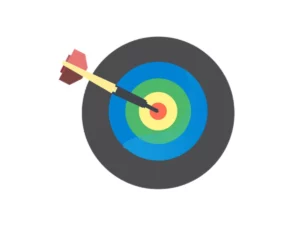
When creating, designing, and launching your author-website, focus on what you want from your website—do you want it to be an online store? A hub for promoting books? Maybe a platform for connecting with readers and followers? A clear aim helps build a theme for your website. The type of technology, the amount of money and effort you want to spend depends on the features you want to put into your website.
Not having enough features will damage your goals, and having unnecessary complications will make your website difficult to navigate and hard to maintain. So think about what you want to achieve from your website and plan the following points in accord.
Research your Audience

Having good content is important, but it’s not enough. Good content to a wrong crowd is bound to fail. So research your audience and find out as much as you can about them. Do they prefer long or short articles? Do they prefer text, images, videos, or presentations? Are they comfortable with computers or mobile devices? What are their fields of interest? Do they easily subscribe, provide testimonials, buy books, grab freebies, etc. The more information you have, the better you would plan your content.
There are a few ways to go about it. You can take help of internet articles with already published research, or talk to an expert. However, if you want to do it yourself, the best way is to use your social media channels. Create polls and ask them directly what they would like to see in your niche. You will learn a lot about what you can do on your website that would create a unique and engaging content.
Note: Audience research is a continuous process. Even after you build your website, you can use several analytics tools to gain knowledge about your readers.
Set-up an eCommerce Store

Setting up an eCommerce store or blog is a great way to sell your literary works online. Make sure that you target specific markets (books for children, romance novels, etc.), list all the relevant product information on pages with easy clickability, and add attractive graphics that will capture customer attention.
The most important part of setting an online store is ensuring the security in payment and delivery accuracy. Your readers will not return to your website if they lose their money or cannot get the product even after spending it. If you offer downloadable content, it is easy. However, if you are selling hard copies, you must maintain a clear chain of communication until your book reaches the customer.
Also, before selling your books on your website, think if it is worthful. Especially if you are a new self-published author, consider driving your traffic to your publishing channel (like Kindle, Ingram Spark, etc.). Selling your book from your website may impact your ranking on those websites and will cause more harm than good. So weigh in the pros and the cons of having an eCommerce store on your website before deciding.
Get Help with Content and SEO
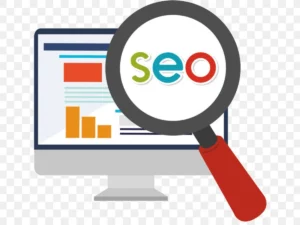
Content and SEO are critical factors in any online marketing strategy. If you’re not careful, you could end up spending a lot of money on things that won’t have an impact. So, it is important to plan the entire process carefully before starting anything.
Content planning is a crucial step. Once you have a grasp on what your audience wants, create enough content to satisfy their needs. Choose 5 to 10 keywords and build a list of keywords around it. Also, include long tail keywords and FAQs, and write your content that can answer all the questions.
A standard practice is to write at least 20 titles before you write your first article. Read here the benefits of blogging if you are a writer. Also, create images, videos, etc. that are matching to your text and your brand image, and create diverse content for different publishing channels, like website, social media channels, etc.
Last, hiring somebody who specializes in content creation will save both time and energy for you—especially if the content type is not in your expertise, and needs to be high quality and original.
Offer Services, Courses, Giveaways, etc.

Author-website promotion is one of the best ways to market your books and build a strong brand identity for yourself. By offering valuable content, you will attract readers who want to learn more about what you offer. Writing informative articles and creating videos are excellent methods, but only a few of the people come on the internet for education. Also, there is a ton of reading material for you to compete with.
In such a competitive market, you need an edge. Free services like courses, free tools, and giveaways go to great lengths for adding value to your content. Choose the best way you can offer such services in your niche.
You can ask yourself what your audience needs, searches, or gets at a premium price. Although you have to put in effort to create such services, but while creating a new author-website you need this step if you want to rank in the search engines, or gain traction amongst your readers. Also, tools like free courses and free eBooks are a great way to collect emails.
Decide on the Content Types

There are a few things to consider when determining the content types while creating your author-website. First, what will you use your website for? Are you selling products or is just a display of your portfolio? Second, which design you want. Is it academic, authoritative, casual, entertaining, etc? Third, think about whether you want to offer e-books and/or courses as part of your offering—doing so can add extra revenue streams. Last, make sure that your chosen platform is robust enough—it should be able to handle all the traffic generated by your website content!
Also, your content type depends on what you are doing. For example, online courses are a mix of texts and videos, a blog should be a mix of images and text, and your landing page should have text, images, and videos.
Similarly, an educative blog should only have images with the text, while a fun blog can have GIFs and even short videos. A children’s book author will benefit from posting fun comic strips, while a non-fiction author will be more engaging by publishing podcasts.
So use your target audience research, your niche, keywords, and all other factors to decide which content works best for you.
Choose Your Monetization Channels

For monetizing your website, there are several options available. From selling products and services to offering premium content, affiliate marketing, or ads, choose something that will work best for your business. Consider your target audience and decide which of the methods do not break your brand, niche, and design.
For example, if a published author monetizes by ads and spams their own website, it is unlikely that their fans would like the commercial angle. While an author who promotes their website as a service like an online course may use ads to earn extra income.
Also, while inviting ads on your website (for example, using Google Adsense), you should be careful that the ads are not out of sync with your theme. A spiritual website that displays ads for cosmetics and condoms will become a joke. Also, an eLearning website displaying a lot of ads from other course offering website is harming itself. So while fine-tuning your ad settings, keep things in mind.
You should research and decide these things before creating your author-website. Once you have settled on a few viable strategies, be consistent with them and measure results regularly in order to fine tune them as needed.
Choose Your Social Media Platforms

Choosing the right social media platform is an important part of content marketing. However, it’s not enough simply to pick one and start posting. You need to choose a platform that suits your target market, as well as the type of content you plan on publishing.
For example, if you are a business owner blogging about marketing tips or product reviews, then Twitter would be a better choice than LinkedIn. While, if you are targeting luxury buyers who might enjoy reading lengthy blog posts on fashion trends and designers, then LinkedIn would be more appropriate since it offers a greater audience reach. Be sure to keep your readers updated with regular tweets and replies (if applicable).
Choose a Domain Name
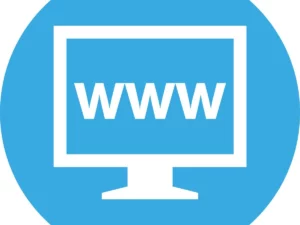
You are now ready to build your website. Now is the time to decide what your domain name should be. As with anything in life, choosing a domain name is an important step in starting your online business (or creating a simple author-website).
There are a few things to keep in mind when selecting the perfect one:
It should be easy to remember and spell correctly.
Choose a domain name that accurately reflects what your business does and who you are as an individual or company.
For example, a simple author-website’s domain name should be the author’s name, but if you are creating your author-website to sell courses, you can be creative with the domain name.
Last, if possible, try to include one of your important keywords in your domain name.
Select the Right Platform and Host
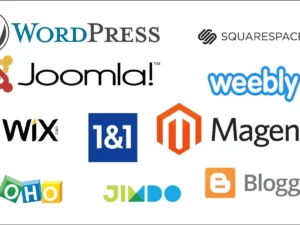
Picking the right platform and host can be daunting. It depends on what are your objectives and how heavy or feature full your website is going to be. If you are going to build it yourself, WordPress, Wix, Squarespace, and Weebly are good options.
Also, if your website needs to be full of heavy features like online courses, ecommerce, forums, etc, consider contacting a professional, as these features require a lot of fine-tuning with the code to keep the website fast and efficient.
For hosting, if you have a simple blog that has low to middle traffic, shared hosting is cost effective for you, but a website with a lot of images on one page or one that has heavy traffic requires dedicated hosting. There are many options available in both the departments. Research on which of the hosting providers offer you the services that you need and are cost effective, and choose one.
Establish Copyright and Licensing Rights
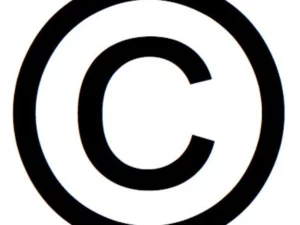
One of the most important steps in creating a successful author-website is protecting your intellectual property rights. This includes making sure you clearly state who owns the copyright on all your content, and securing any necessary copyright licenses from photographers or other sources, if applicable.
Apart from this, it’s also essential to choose a domain name that best reflects your business and target audience – one that is not easily associated with others in the same industry.
It’s helpful to keep track of these things so you can protect yourself against potential lawsuits down the line. However, be weary not to overdo it; too much legal protection might actually inhibit rather than promote creativity and innovation!
Secure Your Website

Website security and online protection are always important. That’s why it’s essential to secure your website with a SSL certificate. This will encrypt all data traveling between your site and the internet, making sure that no one can snoop on your confidential information.
Keep your passwords secure, install anti-spamming and anti hacking measures and use your cookies wisely. If you process payments through your website, choose trust worthy payment gateways and be extra careful in handling your customers’ data.
Plan Your Launch Carefully

No website launch is complete without a well-crafted plan of action. Without a solid guide, you’re likely to end up with a website that looks terrible and doesn’t help your author career in the slightest. Document every step of the process—from ideation to final design. And be prepared for an arduous SEO (Search Engine Optimization) campaign—it’s essential if you want your site to rank high on search engines. Remember, good design isn’t limited only to aesthetics; it has an enormous impact on user experience as well!
Conclusion
Creating an author-website can be a very rewarding experience. However, it’s important to ensure that you go about it the right way to avoid any potential failure. Consider these points before starting your website: what will be the focus of the website, what design and layout options are available, and who will create and maintain the website? By following these tips, you’ll be on your way to creating a successful author-website!
More Resources:
Essential and optional elements of an author-website.
How to create a WordPress website from scratch.
How to make your website look professional.


